U.S. History: Mid-Century and Cold War - 1950–1999
Updated September 13, 2021 |
Infoplease Staff


Timeline: Mid-Century and Cold War
1950-1999
Here's a timeline of major events in U.S. History from 1950–1999, including the Korean War, Cuban Missile Crisis, Civil Rights Act, and more.
1950 –
1953
- Korean War: Cold war conflict between Communist and non-Communist forces on Korean Peninsula.
June 25, 1950
- North Korean communists invade South Korea.
June 27
- President Truman, without the approval of Congress, commits American troops to battle.
April 11, 1951
- President Truman removes Gen. Douglas MacArthur as head of U.S. Far East Command.
July 27, 1953
- Armistice agreement is signed.
1950 –
1975
May 1950
- Vietnam War: Prolonged conflict between Communist forces of North Vietnam, backed by China and the USSR, and non-Communist forces of South Vietnam, backed by the United States. President Truman authorizes $15 million in economic and military aid to the French, who are fighting to retain control of French Indochina, including Vietnam. As part of the aid package, Truman also sends 35 military advisers.
August 2, 1964
- North Vietnamese torpedo boats allegedly attack U.S. destroyer in Gulf of Tonkin off the coast of North Vietnam.
August 7
- Congress approves Gulf of Tonkin resolution, authorizing President Johnson to take any measures necessary to defend U.S. forces and prevent further aggression.
February 1965
- U.S. planes begin bombing raids of North Vietnam.
March 8–9
- First U.S. combat troops arrive in South Vietnam.
January – February 1968
- North Vietnamese army and Viet Cong launch Tet Offensive, attacking Saigon and other key cities in South Vietnam.
March 16
- American soldiers kill 300 Vietnamese villagers in My Lai massacre.
May 1, 1970
- U.S. troops invade Cambodia.
Jan. 27, 1973
- Representatives of North and South Vietnam, the Viet Cong, and the U.S. sign a cease-fire agreement in Paris.
March 29
- Last U.S. troops leave Vietnam
April 30, 1975
- South Vietnamese government surrenders to North Vietnam; U.S. embassy Marine guards and last U.S. civilians are evacuated.
1951
February 27
- Twenty-Second Amendment to the Constitution is ratified, limiting the president to two terms.
September 4
- President Truman speaks in first coast-to-coast live television broadcast.
1952
July 25
- Puerto Rico becomes a U.S. commonwealth.
November 1
- First hydrogen bomb is detonated by the U.S. on Eniwetok, an atoll in the Marshall Islands.
1953
January 20
- Dwight Eisenhower is inaugurated as the 34th president.
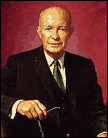 Dwight D. Eisenhower
Dwight D. Eisenhower
June 19
- Julius and Ethel Rosenberg are executed for passing secret information about U.S. atomic weaponry to the Soviets.
1954
April 22–June 17
- Sen. Joseph R. McCarthy accuses army officials, members of the media, and other public figures of being Communists during highly publicized hearings.
May 17
- Brown v. Board of Education of Topeka, Kans.: Landmark Supreme Court decision declares that racial segregation in schools is unconstitutional.
1957
January 21
- Eisenhower's second inauguration.
September 24
- President sends federal troops to Central High School in Little Rock, Ark., to enforce integration of black students.
1958
January 31
- Explorer I, first American satellite, is launched.
 Explorer I
Explorer I
1959
January 3
- Alaska becomes the 49th state.
August 21
- Hawaii becomes the 50th state.
1961
January 3
- U.S. severs diplomatic relations with Cuba.
January 20
- John F. Kennedy is inaugurated as the 35th president.
April 17–20
- Bay of Pigs invasion of Cuba fails.
May
- A mixed-race group of volunteers sponsored by the Committee on Racial Equality—the so-called Freedom Riders—travel on buses through the South in order to protest racially segregated interstate bus facilities.
1962
February 20
- Lt. Col. John Glenn becomes first U.S. astronaut to orbit Earth.
October 22 – November 20
- Cuban Missile Crisis: President Kennedy denounces Soviet Union for secretly installing missile bases on Cuba and initiates a naval blockade of the island.
1963
August 28
- Rev. Martin Luther King, Jr., delivers his “I Have a Dream” speech before a crowd of 200,000 during the civil rights march on Washington, DC.
November 22
- President Kennedy is assassinated in Dallas, Tex. He is succeeded in office by his vice president, Lyndon B. Johnson.
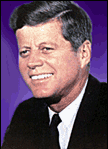 John F. Kennedy
John F. Kennedy
1964
July 2
- President Johnson signs the Civil Rights Act.
1965
January 4
- In his annual state of the Union address, President Johnson proposes his Great Society program.
January 20
- L. Johnson's second inauguration.
March 7
- State troopers attack peaceful demonstrators led by Rev. Martin Luther King, Jr., as they try to cross bridge in Selma, Ala.
August 6
- President Johnson signs the Voting Rights Act, which prohibits discriminatory voting practices.
August 11–16
- In six days of rioting in Watts, a black section of Los Angeles, 35 people are killed and 883 injured.
1966
June 13
- Miranda v. Arizona: Landmark Supreme Court decision further defines due process clause of Fourteenth Amendment and establishes Miranda rights.
1967
February 10
- Twenty-Fifth Amendment to the Constitution is ratified, outlining the procedures for filling vacancies in the presidency and vice presidency.
1968
April 4
- Rev. Martin Luther King, Jr., is assassinated in Memphis, Tenn.
June 5 – 6
- Sen. Robert F. Kennedy is assassinated in Los Angeles, Calif.
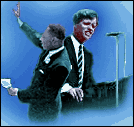 Martin Luther King and Robert F. Kennedy
Martin Luther King and Robert F. Kennedy
1969
January 20
- Richard Nixon is inaugurated as the 37th president.
July 20
- Astronauts Neil Armstrong and Edwin Aldrin, Jr., become the first men to land on the Moon.
1970
May 1
- Four students are shot to death by National Guardsmen during an antiwar protest at Kent State University.
1971
July 1
- The Twenty-Sixth Amendment to the Constitution is ratified, lowering the voting age from 21 to 18.
1972
February 21–27
- Nixon makes historic visit to Communist China.
May 26
- U.S. and Soviet Union sign strategic arms control agreement known as SALT I.
June 17
- Five men, all employees of Nixon's reelection campaign, are caught breaking into rival Democratic headquarters at the Watergate complex in Washington, DC.
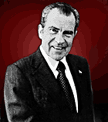 Richard M. Nixon
Richard M. Nixon
1973
January 20
- Nixon's second inauguration.
January 22
- Roe v. Wade: Landmark Supreme Court decision legalizes abortion in first trimester of pregnancy.
May 17 – August 7
- Senate Select Committee begins televised hearings to investigate Watergate cover-up.
October 10
- Vice President Spiro T. Agnew resigns over charges of corruption and income tax evasion.
October 12
- President Nixon nominates Gerald R. Ford as vice president.
Dec. 6
- Gerald R. Ford is confirmed by Congress and sworn in.
- Ford is the first vice president to succeed to the office under the terms laid out by the Twenty-Fifth Amendment.
1974
July 27–30
- House Judiciary Committee recommends to full House that Nixon be impeached on grounds of obstruction of justice, abuse of power, and contempt of Congress.
August 9
- Nixon resigns; he is succeeded in office by his vice president, Gerald Ford.
September 8
- Nixon is granted an unconditional pardon by President Ford.
October 15
- Five former Nixon aides go on trial for their involvement in the Watergate cover-up; H. R. Haldeman, John D. Ehrlichman, and John Mitchell eventually serve time in prison.
December 19
- Nelson Rockefeller is confirmed and sworn in as vice president.
1977
January 20
- Jimmy Carter is inaugurated as the 39th president.
 Jimmy Carter
Jimmy Carter
September 7
- President Carter signs treaty agreeing to turn control of Panama Canal over to Panama on Dec. 31, 1999.
1978
September 6
- President Carter meets with Egyptian president Anwar Sadat and Israeli prime minister Menachem Begin at Camp David.
September 17
- Sadat and Begin sign Camp David Accord, ending 30-year conflict between Egypt and Israel.
1979
January 1
- U.S. establishes diplomatic ties with mainland China for the first time since Communist takeover in 1949.
March 28
- Malfunction at Three Mile Island nuclear reactor in Pennsylvania causes near meltdown.
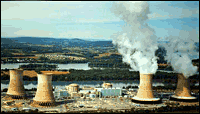 Three Mile Island
Three Mile Island
October 1
- Panama takes control of the Canal Zone, formerly administered by U.S..
November 4
- Iranian students storm U.S. embassy in Teheran and hold 66 people hostage.
November 19–20
- 13 of the hostages are released.
1980
January 20
- President Carter announces that U.S. athletes will not attend Summer Olympics in Moscow unless Soviet Union withdraws from Afghanistan.
February 2
- FBI's undercover bribery investigation, code named Abscam, implicates a U.S. senator, seven members of the House, and 31 other public officials.
April 25
- U.S. mission to rescue hostages in Iran is aborted after a helicopter and cargo plane collide at the staging site in a remote part of Iran and 8 servicemen are killed.
1981
January 20
- Ronald Reagan is inaugurated as the 40th president.
January 20
- U.S. hostages held in Iran are released after 444 days in captivity.
March 30
- President Reagan is shot in the chest by John Hinckley, Jr.
September 25
- Sandra Day O'Connor is sworn in as the first woman Supreme Court justice.
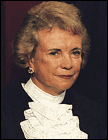 Sandra Day O'Connor
Sandra Day O'Connor
1982
June 30
- Deadline for ratification of the Equal Rights Amendment to the Constitution passes without the necessary votes.
1983
October 25
- U.S. invades Caribbean island of Grenada after a coup by Marxist faction in the government.
1985
January 21
- Reagan's second inauguration.
1986
January 28
- Space shuttle Challenger explodes 73 seconds after liftoff, killing all seven crew members. It is the worst accident in the history of the U.S. space program.
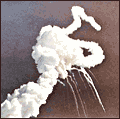 Challenger
Challenger
April 14
- U.S. bombs military bases in Libya in effort to deter terrorist strikes on American targets.
November
- Iran-Contra scandal breaks when White House is forced to reveal secret arms-for-hostages deals.
1987
May 5 – August 3
- Congress holds public hearings in Iran-Contra investigation.
June 12
- In a speech in Berlin, President Reagan challenges Soviet leader Mikhail Gorbachev to “tear down this wall” and open Eastern Europe to political and economic reform.
December 8
- Reagan and Gorbachev sign INF treaty, the first arms-control agreement to reduce the superpowers' nuclear weapons.
1989
January 20
- George H. W. Bush is inaugurated as the 41st president.
March 24
- Oil tanker Exxon Valdez runs aground in Prince William Sound, spilling more than 10 million gallons of oil. It is the largest oil spill in U.S. history.
August 9
- President Bush signs legislation to provide for federal bailout of nearly 800 insolvent savings and loan institutions.
December 20
- U.S. forces invade Panama in an attempt to capture Gen. Manuel Noriega, who previously had been indicted in the U.S. on drug trafficking charges.
1990
August 2
- Iraqi troops invade Kuwait, leading to the Persian Gulf War.
1991
January 16 – February 28
- Persian Gulf War: U.S. leads international coalition in military operation (code named “Desert Storm”) to drive Iraqis out of Kuwait.
April 6
- Iraq accepts terms of UN ceasefire, marking an end of the war.
July 31
- U.S. and Soviet Union sign START I treaty, agreeing to further reduce strategic nuclear arms.
October 11–13
- Senate Judiciary Committee conducts televised hearings to investigate allegations of past sexual harassment brought against Supreme Court nominee Clarence Thomas by Anita Hill, a law professor at the University of Oklahoma.
1992
February 1
- Following the breakup of the Soviet Union in Dec. 1991, President Bush and Russian president Boris Yeltsin meet at Camp David and formally declare an end to the cold war.
 Boris Yeltsin and George Bush
Boris Yeltsin and George Bush
April 29
- The acquittal of four white police officers charged in the 1991 beating of black motorist Rodney King in Los Angeles sets off several days of rioting, leading to more than 50 deaths, thousands of injuries and arrests, and $1 billion in property damage.
December 4
- President Bush authorizes sending U.S. troops to Somalia as part of UN relief effort.
December 24
- President Bush grants pardons to six officials convicted or indicted in the Iran-Contra scandal, leading some to suspect a cover-up.
1993
January 20
- Bill Clinton is inaugurated as the 42nd president.
 William J. Clinton
William J. Clinton
February 26
- Bomb explodes in basement garage of World Trade Center, killing 6, injuring 1,000, and causing more than $500 million in damage.
April 19
- After 51-day standoff with federal agents, Branch Davidian compound in Waco, Tex., burns to the ground, killing 80 cult members.
June 26
- President Clinton orders missile attack against Iraq in retaliation for alleged plot to assassinate former President Bush.
October 3–4
- Eighteen U.S. soldiers are killed in ambush by Somali militiamen in Mogadishu.
December 8
- President Clinton signs North American Free Trade Agreement into law.
1994
May 6
- Paula Jones, a former Arkansas state employee, files a federal lawsuit against President Clinton for sexual harassment.
1995
April 19
- Bombing of federal office building in Oklahoma City kills 168 people.
July 11
- U.S. establishes full diplomatic relations with Vietnam.
December
- President Clinton sends first 8,000 of 20,000 U.S. troops to Bosnia for 12-month peacekeeping mission.
December 16 – January 6
- Budget standoff between President Clinton and Congress results in partial shutdown of U.S. government.
1997
January 20
- Clinton's second inauguration.
1998
January 17
- President Clinton denies having had a sexual relationship with a White House intern named Monica Lewinsky.
February 2
- President Clinton releases 1999 federal budget plan; it is the first balanced budget since 1969.
August 17
- In televised address, President Clinton admits having had a sexual relationship with Monica Lewinsky.
August 20
- U.S. launches missile attacks on targets in Sudan and Afghanistan following terrorist attacks on U.S. embassies in Kenya and Tanzania.
December 16
- U.S. and Britain launch air strikes against weapons sites in Iraq.
December 19
- House of Representatives votes to impeach President Clinton on charges of perjury and obstruction of justice.
1999
February 12
- Senate acquits Clinton of impeachment charges.
March 24 – June 10
- NATO wages air campaign against Yugoslavia over killing and deportation of ethnic Albanians in Kosovo.
April 20
- School shooting at Columbine High School in Littleton, Colo., leaves 14 students (including the 2 shooters) and 1 teacher dead and 23 others wounded.
November 15
- U.S. and China sign historic trade agreement.
See also:







